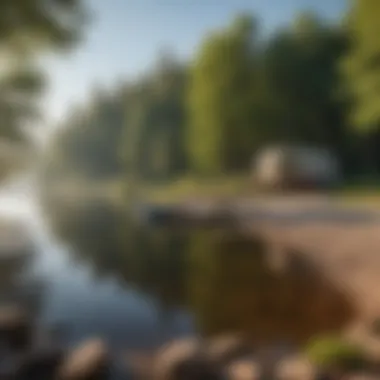Exploring Campgrounds in Lower Michigan: A Comprehensive Overview


Intro
Lower Michigan boasts a unique tapestry of landscapes, offering diverse campgrounds that cater to outdoor enthusiasts. This region's natural beauty is not only a backdrop for recreational activities but also a crucial element in maintaining ecological balance. Understanding these campgrounds involves an exploration of their ecological significance, the recreational opportunities they provide, and the sustainable practices that are increasingly essential in modern outdoor management.
This article will delve into the rich forest ecology and biodiversity present in Lower Michigan's campgrounds, examine sustainable forestry practices, and highlight community engagement efforts. Each aspect plays a vital role in fostering a harmonious relationship between visitors and nature, ensuring that these areas remain vibrant for future generations.
Forest Ecology and Biodiversity
Importance of Forest Ecosystems
Forest ecosystems in Lower Michigan are characterized by a high level of biodiversity. They serve as habitats for myriad species, contributing to the health of local wildlife and supporting ecological functions. These forests play a pivotal role in carbon sequestration, soil stabilization, and water filtration, thus enhancing the regional environment. The interplay between tree species, understory plants, and animal life creates a complex web that sustains ecological equilibrium.
Flora and Fauna in Woodlands
The woodlands of Lower Michigan are home to both common and rare plant species, including sugar maples and red oaks. Visitors may encounter a variety of wildlife, from deer grazing quietly to birds chirping in the canopies. Prominent species include the Eastern Bluebird and the Red-tailed Hawk. The seasonal changes in these ecosystems further showcase the rich biodiversity, as different species thrive in varying conditions.
"Preserving the biodiversity of forest ecosystems is essential for the health of our planet. Each species plays a role in the intricate balance that sustains life."
Sustainable Forestry Practices
Techniques for Responsible Management
In the face of environmental challenges, sustainable forestry practices are crucial. Techniques such as selective logging, reforestation, and forest thinning help maintain the health of forest habitats. These methods ensure that ecosystems remain resilient while continuing to provide recreational spaces for visitors. Furthermore, incorporating technology in forest management helps monitor ecological health and improve resource use.
Certification Schemes and Standards
Adopting certification schemes like the Forest Stewardship Council promotes responsible forestry. Such standards guide campground management in Lower Michigan, emphasizing the importance of preserving natural habitats while providing safe and enjoyable experiences for visitors. This commitment to sustainability helps to build trust within local communities and ensures responsible stewardship of natural resources.
Community Engagement and Stewardship
Role of Local Communities
Local communities play a significant role in the management and preservation of campgrounds. They engage in activities that promote awareness and education regarding forest ecology. By fostering a sense of ownership, community members can effectively advocate for sustainable practices that protect these vital ecosystems.
Volunteer Opportunities for Engagement
Numerous volunteer programs are available for those interested in contributing to the well-being of Lower Michigan's campgrounds. By participating in trail maintenance, reforestation efforts, or educational programs, individuals can directly impact their environment. These opportunities not only enhance the experience for visitors but also strengthen community ties to natural spaces.
Intro to Campgrounds in Lower Michigan
Lower Michigan offers a diverse array of campgrounds that attract nature enthusiasts and adventure seekers alike. The significance of these campgrounds extends beyond mere recreation; they play a crucial role in promoting ecological health, fostering community engagement, and providing a venue for outdoor education.
Camping presents benefits such as physical well-being, mental relaxation, and an opportunity to connect with the environment. People can partake in activities like hiking, fishing, and wildlife observation. These experiences not only enrich personal life but also contribute to a broader understanding of the importance of conservation and stewardship.
The campgrounds in this area cater to different preferences and needs, whether individuals seek a rugged wilderness experience or a more comfortable family camping trip. Understanding the geographical layout and the historical context of these campgrounds can enhance one’s appreciation for Michigan’s natural landscapes.
Moreover, awareness regarding campground management and sustainability practices ensures that these areas remain viable for future generations. Consequently, exploring the campgrounds in Lower Michigan is more than just an outdoor activity; it is an investment in nature conservation and education.
Geographical Overview
Lower Michigan is characterized by its diverse ecosystems, stretching across both rural and urban landscapes. A variety of natural features such as forests, lakes, and rivers define the region. The state is surrounded by the Great Lakes, providing numerous water-based recreational opportunities.
The terrain is mainly flat, with some hilly areas in the southern regions. This geographical disposition contributes to the different types of camping experiences. For instance, areas near the lakes offer water-related activities, while forests provide hiking trails and wildlife observation opportunities.
Several notable campgrounds are close to significant attractions, enhancing their appeal. Campgrounds located within state parks or national forests benefit from established trail systems and visitor amenities. The variety in landscape allows campers to choose their preferred setting, whether they want waterfront views or wooded retreats.


Historical Context of Camping in Michigan
Camping in Michigan has a rich history, dating back to indigenous peoples who used the land for sustenance and shelter. Throughout the 20th century, the outdoor recreational movement gained momentum. The establishment of state parks and forests during the 1930s expanded access to nature and promoted camping.
From the onset of camping culture, families began to embrace outdoor experiences as a way of bonding and escaping urban life. The introduction of camping gear made it more convenient, increasing participation in this recreational activity. Events like the Michigan State Fair also highlighted camping and outdoor activities, fostering a community of campers that persists today.
In recent years, with the environmental movement, there has been a shift towards sustainable practices in camping. This includes promoting Leave No Trace principles and understanding the ecological impact of camping activities. As such, the historical evolution of camping in Michigan reflects a transition from mere enjoyment of nature to a deeper appreciation and responsibility toward environmental stewardship.
Types of Campgrounds
Understanding the various types of campgrounds in Lower Michigan is essential for both recreational users and forestry professionals. Each type of campground serves unique functions and offers distinct benefits that cater to different audiences and preferences. From state parks to private grounds, identifying these types can enhance outdoor experiences and help in planning visits effectively.
State Parks and Recreation Areas
State parks play a fundamental role in Michigan’s ecosystem. They are protected areas specifically designated for preservation and public enjoyment. The state parks in Lower Michigan, such as the Holly State Recreation Area and Lakeport State Park, provide vast systems of trails and amenities for horseback riding, hiking, and biking.
The advantages of choosing state parks include structured facilities ranging from picnic areas to well-maintained restrooms. Moreover, they often have ranger-led programs, which educate visitors about local wildlife and plant life. The natural beauty found within these parks attracts families and outdoor enthusiasts, ensuring a healthy engagement with nature.
National Forests and Campgrounds
National forests, like the Manistee National Forest, offer a blend of rugged terrain and varied ecosystems. The campgrounds within these forests often feature primitive sites, which promote a more isolated camping experience. Visitors can experience backcountry camping, which necessitates self-sufficiency and deep immersion in nature.
The forests are rich with wildlife and provide ample opportunities for fishing, hiking, and wildlife viewing. Camping in national forests can lead to memorable experiences, such as spotting a whitetail deer or the call of a loon at dawn. Furthermore, accessing national forests often does not require advanced reservations, providing flexibility for spontaneous adventures.
Private Campgrounds
Private campgrounds in Lower Michigan complement public options by providing diverse amenities that cater to a variety of preferences. Facilities like Lakeshore RV Park offer conveniences such as electricity, running water, and recreational vehicle hookups. This makes them appealing for families seeking comfort alongside their outdoor endeavors.
Many private campgrounds prioritize community engagement with organized activities, such as games and events, creating a vibrant social atmosphere. However, it is essential to compare reviews and amenities as quality can vary significantly. Campers should consider what experiences they desire and how they prefer to interact with nature.
Key Campgrounds in Lower Michigan
Understanding the key campgrounds in Lower Michigan is essential for outdoor enthusiasts and professionals alike. These campgrounds provide a diverse array of experiences and cater to different types of campers, from families seeking a leisurely weekend to individuals looking for adventure. The amenities available in these campgrounds reflect both comfort and the need to co-exist with nature. Furthermore, they serve as vital components of local ecosystems, promoting conservation and responsible use of natural resources.
A Comprehensive List
Lower Michigan is home to several distinct campgrounds that range from state parks to private sites. Popular campgrounds include:
- Holly Recreation Area: Offers wooded sites and proximity to lakes.
- Sleepy Hollow State Park: Known for its expansive area and rich wildlife.
- Lakeport State Park: Provides sandy beaches and family-friendly amenities.
- Kalamazoo River Valley: Features scenic views and water access.
Each location provides various experiences suited for different recreational needs. This variety ensures that campers can find a suitable site, fostering a greater connection with nature.
Notable Features and Amenities
Restroom Facilities
Restroom facilities are an important aspect of any campground. They directly influence hygiene and comfort for visitors. The key characteristic of these facilities at Lower Michigan campgrounds is their maintenance and accessibility. Many campgrounds ensure that restrooms are clean and stocked with essential supplies, making them a beneficial choice for families and groups. One unique feature might be the availability of ADA-compliant restrooms, enhancing inclusivity. However, the limitations can arise during busy seasons when lines may build up, which could impact convenience for campers.
Showers and Water Access
Showers and water access contribute significantly to the overall camping experience. Campgrounds with shower facilities facilitate cleanliness, especially after a long day of hiking or swimming. A notable feature often includes hot water availability, which adds comfort during colder months. This makes these campgrounds attractive to visitors who prioritize hygiene. However, some campgrounds may face challenges like limited hot water supplies during peak times. This could lead to longer wait times, detracting from an otherwise pleasant experience.
Fire Pits and Grills
Fire pits and grills are essential additions to campgrounds, promoting social gathering and cooking experiences. The key characteristic of such amenities is their ability to enhance social interaction among campers, creating memorable moments. Many campgrounds provide designated fire pits for safety and convenience. Additionally, some sites offer grill stations for easier meal preparation. However, there could be restrictions on fire usage during high-risk weather conditions, which is an essential consideration for campers.
Accessibility and Location


Accessibility in campgrounds is crucial for ensuring that all campers can enjoy the outdoors. Many campgrounds in Lower Michigan are strategically located near main highways, making them easily reachable. Furthermore, the availability of accessible paths and facilities for those with mobility issues reflects a growing awareness of inclusivity in the camping sector.
The proximity to urban areas also allows day-trippers to venture out without extensive travel. However, potential challenges could arise in the form of seasonal road closures or maintenance, which could affect access. These considerations play a vital role in planning a camping trip and should be factored into any itinerary.
Recreational Opportunities
Recreational opportunities are essential components of camping experiences in Lower Michigan. They enhance the value of campgrounds by providing activities that attract a variety of visitors, whether they seek adventure, relaxation, or a connection with nature. Understanding these pursuits can greatly improve one’s experience and inform choices when selecting a campground.
Hiking Trails
In Lower Michigan, hiking trails are abundant and cater to all levels of experience. Hiking not only serves as an excellent form of exercise but also provides a unique way to explore the region's diverse landscapes. Trails range from easy, well-marked paths in state parks to more rugged terrains in national forests.
Popular locations like Hartwick Pines State Park feature trails that wind through pristine forests, showcasing Michigan's natural beauty. The connectedness with the environment during hikes also fosters appreciation for the area's ecology.
Consider some important factors when planning a hiking trip:
- Trail Difficulty: Select trails that match your ability and skill level.
- Trail Length and Duration: Know the estimated time to complete a trail.
- Seasonal Considerations: Certain trails may be less accessible in winter.
Fishing and Water Activities
Fishing and water activities represent significant draws for campers in Lower Michigan. The extensive lakes and rivers provide plentiful opportunities for fishing, with species such as bass and trout being common. Campgrounds often offer boat launches or nearby fishing spots, enhancing convenience for anglers.
In addition to fishing, various water activities like kayaking, canoeing, and swimming are popular. These activities allow visitors to engage with the natural world actively. Notable waterways include Lake Michigan and the Au Sable River, where not only fishing but also scenic paddling awaits.
Key considerations when engaging in water activities include:
- Licensing: Ensure proper fishing licenses are obtained according to local regulations.
- Safety: Always wear life jackets when participating in water sports, especially with children.
- Environmental Impact: Respect aquatic ecosystems by following guidelines for responsible boating and fishing.
Wildlife Watching
Wildlife watching adds another layer of enjoyment to camping trips in Lower Michigan. The region hosts numerous species, including deer, various birds, and smaller mammals. This activity encourages patience and attentiveness while also enhancing understanding of local ecosystems.
Several areas are particularly renowned for wildlife watching. Parks like the Allegan State Game Area provide excellent opportunities to observe wildlife in their natural habitats.
For a satisfying wildlife watching experience, consider the following:
- Timing: Early mornings and late afternoons are often the best times to spot animals.
- Quiet Observation: Minimize noise to avoid startling wildlife.
- Respect Nature: Maintain a safe distance and avoid feeding animals, as this disrupts their natural behaviors.
By engaging in these recreational activities, visitors not only supply themselves with memorable experiences but also contribute to the conservation and appreciation of Lower Michigan's environment.
Sustainable Camping Practices
Sustainable camping practices are essential for maintaining the ecological balance in Lower Michigan's diverse landscapes. These practices help ensure that future generations can enjoy the natural beauty and recreational opportunities that the area offers. By adopting sustainable methods, campers can mitigate their impact on the environment and contribute to the overall health of local ecosystems. This section focuses on key aspects such as the principles of minimal impact camping and community engagement in conservation efforts.
Leave No Trace Principles
The Leave No Trace principles form the backbone of sustainable camping. These guidelines are designed to help outdoor enthusiasts minimize their impact on the environment. The seven core principles include:
- Plan Ahead and Prepare: This involves understanding the area you will be visiting, which can prevent potential harm and keep natural habitats safe.
- Travel and Camp on Durable Surfaces: Always stick to existing trails and campsites. Avoid creating new paths to protect vegetation.
- Dispose of Waste Properly: This includes packing out everything you bring in, from trash to leftover food.
- Leave What You Find: Avoid taking any natural items, such as plants or stones. This practice helps maintain the ecosystem's integrity.
- Minimize Campfire Impact: Use a camp stove for cooking instead of building a fire. If fires are permitted, choose established fire rings and keep fires small.
- Respect Wildlife: Observe animals from a distance. Feeding wildlife disrupts their natural foraging habits.
- Be Considerate of Other Visitors: Keep noise levels down and respect the privacy of other campers to foster a peaceful atmosphere.
These principles promote responsible outdoor ethics and educate campers on how to enjoy nature without degrading it. The implementation of these guidelines not only protects the environment but also enhances the camping experience for everyone.
Community Involvement in Conservation Efforts
Participation in local conservation initiatives plays a significant role in sustainable camping practices. Many organizations in Lower Michigan focus on preserving natural habitats and promoting environmental education. Involvement can be through:
- Volunteer Programs: Many local parks and conservation groups offer opportunities for citizens to volunteer for clean-up days, habitat restoration, and educational programming.
- Workshops and Training Sessions: Attending workshops can provide campers with knowledge on local wildlife, ecology, and sustainable practices.
- Monitoring Projects: Engaging in projects that assess habitat health or track wildlife populations can help foster a connection between communities and their natural surroundings.


Engaging in these types of activities fosters a sense of community and responsibility among campers. It creates a network of people dedicated to protecting and preserving Illinois's natural treasures. Moreover, community involvement can instill a deeper understanding and respect for local ecosystems, significantly influencing sustainable practices among campers.
"Community-led initiatives are critical to preserving the integrity of Lower Michigan's camping environments while enhancing the visitor experience."
Campground Regulations and Policies
Campground regulations and policies are essential for maintaining the harmony between human activities and the natural environment in Lower Michigan. They serve not only to protect the ecological integrity of camping areas but also to enhance the safety and enjoyment of visitors. Clear rules regarding reservations, usage, and behavior ensure that everyone can experience the beauty of outdoor spaces without conflict or damage to the environment. This section covers two vital aspects: reservation guidelines and campground etiquette.
Reservation Guidelines
When planning a camping trip, understanding the reservation guidelines is crucial. Many campgrounds require advance booking, especially during peak seasons. Each campground can have its own set of rules regarding the number of people allowed per site, types of equipment permitted, and check-in and check-out times. Here are some important points to consider:
- Advance Booking: Many popular sites filling up quickly, it is advisable to reserve spots several weeks, or even months, in advance.
- Cancellation Policies: Know the cancellation policy of the campground. Some may charge fees for changes or cancellations, while others may offer a full refund if done within a specified time frame.
- Only Designated Sites: Many campgrounds have specific sites for tents, RVs, or cabins. Know where you can set up your equipment to avoid conflicts.
- Pay Attention to Guidelines: Some sites have rules regarding campfires, pet policies, or the amount of noise allowed, which aim to maintain the area's natural tranquility.
It is also important to familiarize yourself with the specific campground you plan to visit to avoid misunderstandings during the reservation process.
Campground Etiquette
Campground etiquette plays a vital role in ensuring that all visitors have a pleasant experience while camping in Lower Michigan. Understanding and practicing good manners while camping can enhance the communal camping experience. Some best practices include:
- Noise Levels: Keep noise to a minimum, especially during early mornings and late evenings. This respect for others' peace helps maintain a quiet environment for relaxation.
- Cleanliness: Always clean up after yourself. Dispose of trash properly and follow the principle of “Leave No Trace,” ensuring that the natural surroundings remain unspoiled for others.
- Respect Wildlife: Do not approach or feed wild animals. This helps maintain a safe distance between humans and wildlife and bolsters the sustainability of natural ecosystems.
- Site Sharing: Be aware of your neighbors. If you have a large group, try to stay within your designated area and avoid encroaching on their space.
In summary, practicing campground etiquette promotes respect and peace among campers, making outdoor experiences more enjoyable for everyone involved.
Adhering to regulations and policies is essential not just for individual satisfaction but also for fostering a sense of community among campers. By observing these guidelines, visitors contribute to the longevity and preservation of campgrounds across Lower Michigan.
Challenges Facing Campgrounds
The viability of campgrounds in Lower Michigan is impacted by several challenges. Understanding these issues is essential for stakeholders, including visitors, campground managers, and conservationists. Addressing these challenges can result in better camping experiences while preserving the natural environment. Factors such as environmental concerns and the influence of climate change form the foundation of these challenges.
Environmental Concerns
Environmental issues are a pressing topic in the management of campgrounds. Factors like pollution, habitat destruction, and the overuse of natural resources can significantly degrade the ecosystems surrounding campgrounds. Given the influx of visitors each season, it is paramount to monitor the impact of human activity on local flora and fauna.
Pollution, particularly from waste and litter, can compromise the water quality in nearby lakes and rivers. It is essential that campgrounds enforce strict waste disposal regulations to minimize this risk. Education on responsible waste practices is vital for encouraging visitors to adhere to these guidelines.
Additionally, habitat destruction can occur if campers stray from designated trails. This can lead to soil erosion and a disruption of wildlife habitats. Therefore, it is necessary to promote awareness about the importance of adhering to established paths. Implementing restoration projects for damaged areas is also crucial in mitigating long-term environmental impacts.
Impact of Climate Change on Camping
Climate change is an unavoidable element that campgrounds in Lower Michigan must contend with. Rising temperatures can alter seasonal patterns, affecting the timing of outdoor activities and the availability of certain attractions. For example, milder winters may shorten the traditional camping season, while increased rainfall could lead to flooding in low-lying areas.
Moreover, changes in weather patterns can influence the types of flora and fauna present in the region. Visitors may find familiar landscapes altered, which could impact wildlife watching and other recreational activities.
In response, campground management should consider adopting adaptive strategies to ensure sustainability. These strategies might involve altering facilities to withstand varying weather conditions or enhancing educational programs focusing on climate resilience.
"Adapting to climate change is not just a necessity; it is a responsibility for all who engage with the natural world."
Culmination
The conclusion of this article serves as an essential reflection on the multifaceted aspects of camping in Lower Michigan. This region, characterized by its diverse landscapes and rich recreational opportunities, holds considerable significance for outdoor enthusiasts and conservation-minded individuals alike. Understanding these dynamics is crucial for fostering a sustainable relationship between campers and the natural environment.
Summary of Key Points
In reviewing the key points discussed throughout this article, we highlight the following:
- Variety of Campgrounds: Lower Michigan offers a broad spectrum of campgrounds, including state parks, national forests, and private sites, each with unique amenities and opportunities for recreation.
- Recreational Activities: The region features numerous activities, such as hiking, fishing, and wildlife watching, contributing to a holistic outdoor experience that caters to diverse interests.
- Sustainable Practices: Emphasis on Leave No Trace principles and community involvement showcases the importance of responsible camping, ensuring the preservation of natural habitats.
- Challenges: Awareness of environmental concerns and the impacts of climate change on camping is essential for ensuring the longevity of these recreational spaces.
Future of Camping in Lower Michigan
Looking ahead, the future of camping in Lower Michigan depends on several factors:
- Adaptive Management: Campgrounds may need to adopt more flexible management strategies to address changes in visitor behavior and environmental conditions. This adaptability is vital for maintaining access and preserving nature.
- Increased Awareness: As public awareness of ecological issues grows, we can expect more campers to prioritize sustainable practices, which can enhance the overall camping experience and protect the ecosystems.
- Technological Integration: The integration of technology, such as advanced reservation systems and mobile apps for campground navigation, will likely streamline the camping experience.
- Community Engagement: Continued community involvement will play a critical role in conservation efforts, creating a sense of shared responsibility among campers and local stakeholders.















